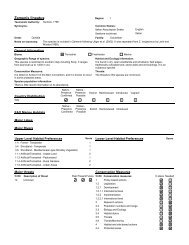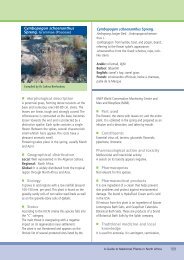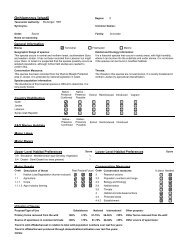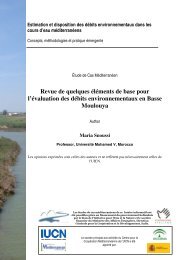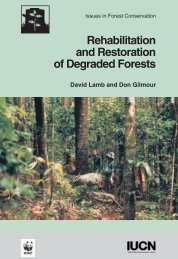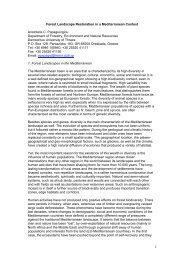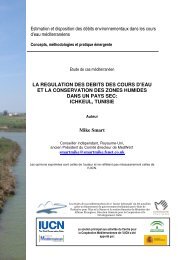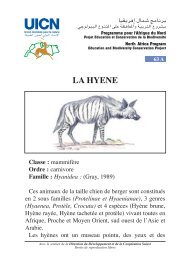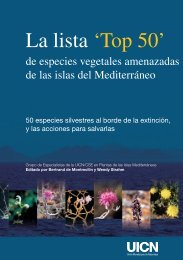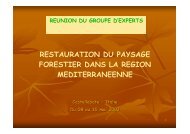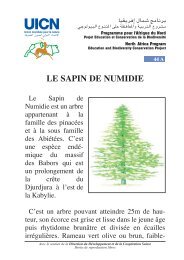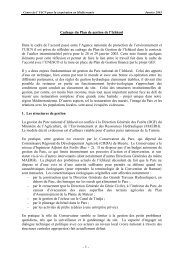The Protected Landscape Approach - Centre for Mediterranean ...
The Protected Landscape Approach - Centre for Mediterranean ...
The Protected Landscape Approach - Centre for Mediterranean ...
Create successful ePaper yourself
Turn your PDF publications into a flip-book with our unique Google optimized e-Paper software.
12. Protecting landscapes and seascapes: experience from coastal regions of Brazil<br />
With this in mind, the workshop designed a Management Plan, which proposed programmes<br />
and projects aimed at improving local citizens’ standard of living, by using natural resources<br />
according to principles and techniques of sustainability. In addition, health and education<br />
initiatives were developed, and the plan included strong emphasis on local/regional economy,<br />
through the implementation of a framework <strong>for</strong> ecotourism. In addition to programmes on<br />
health, education and eco-tourism, were those focusing on heritage conservation, environmental<br />
conservation, sustainable management of natural resources and agriculture.<br />
A Management Committee was established to steer and implement the programme, an<br />
approach that was very advanced at the time, although it has since become mandatory. Speakers<br />
from each of the 20 communities that had been visited were chosen <strong>for</strong> a second five-day<br />
workshop, which resulted in a new <strong>for</strong>mat <strong>for</strong> the Management Committee. This new<br />
governance structure included community members from each Management Unit, allowing<br />
decision-making processes to be closer to local problems, perceptions and wishes.<br />
A management system is important <strong>for</strong> raising funds to implement decisions, and may<br />
facilitate involving people in achieving the mission of development and conservation. <strong>The</strong><br />
inclusion of local people in a real development process, with clear opportunities to contribute to<br />
and participate in this process, can make a difference in fostering a stewardship approach to<br />
conserving the landscape and seascape.<br />
Final considerations<br />
<strong>The</strong>se case-studies demonstrate the important and complementary roles played by the<br />
Biosphere Reserve and the Environmental Protection Area (APA) designations in Brazil’s<br />
coastal zone.<br />
<strong>The</strong> Mata Atlantica Biosphere Reserve is playing an important role both in conservation of<br />
the Mata Atlantica biome and, as noted earlier, in the development of Brazil’s biosphere reserve<br />
programme. <strong>The</strong> Brazilian experience with Biosphere Reserves is a recent one, and the<br />
programme still faces constant challenges, including the consolidation of biosphere reserves to<br />
make them an effective instrument in the various biomes. In these areas it is necessary to create<br />
systems <strong>for</strong> permanent monitoring, reverse the degradation of the natural and cultural patrimony,<br />
and promote territorial organization and the sustainable use of natural resources, while<br />
fostering an improvement in the quality of life of the people. It is obvious that the creation of<br />
Biosphere Reserves alone cannot do all this, but they have certainly helped consolidate some of<br />
these objectives.<br />
<strong>The</strong> special characteristics of APAs – <strong>for</strong> example, their emphasis on participatory and<br />
democratic approaches to management, their reliance on stewardship by local communities,<br />
and their ability to be flexible and adapt to different contexts – make that protected area<br />
category a useful tool <strong>for</strong> the management of working landscapes and, more generally, rural<br />
lands. In a vast country such as Brazil, where planning and management are so often absent, the<br />
APA designation may be considered not only a protected area, but also an instrument <strong>for</strong><br />
environmental planning and management. <strong>The</strong> APA designation can be developed with a view<br />
toward accommodating another approach: the conservation of private lands through the<br />
promotion of stewardship and participatory processes.<br />
175



